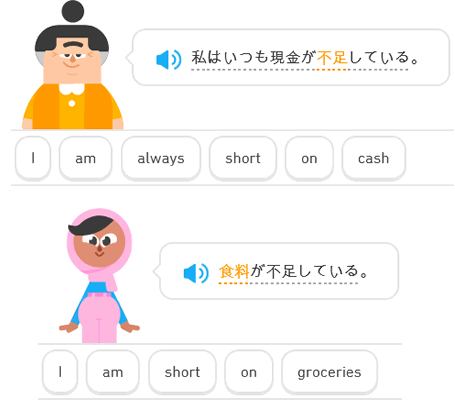Have a look at the English sentences below and see if anything stands out for you.

This comes from the Japanese course on Duolingo, by the way.
For me, the use of short on in these contexts seems odd. I would use short of here. When I saw this, I wondered if this is a difference between British English and American English – the English on Duolingo is generally American English.
I’ve noticed other subtle differences in the ways prepositions and other words like articles are used as well. For example, would you say I’m on the beach or I’m at the beach?
One Japanese way to say you’re short of/on something is 不足している (fusoku shite iru). 不足 (fusoku) on it’s own means insufficiency, deficiency, shortage, lack, scarcity, deficit, dissatisfaction, discontent or complaint. It appears in such expressions as:
- 不足分 (fusokubun) = shortage, amount outstanding (on a loan), deficit
- 不足前 (tarazumae) = deficit, shortage
- 不足勝 (fusokugachi) = needy circumstances
- 不足を言う (fusoku o iu) = to complain, express one’s dissatisfaction
不 (fu / bu) on it’s own means negative, non-, bad, ugly, clumsy, 足 (ashi) means foot, paw, arm, leg, gait or pace, and 足 (soku) it is used as a counter for pairs of footwear. The verb 足りる (tariru) means to be sufficient or enough, and 足る (taru) means to be sufficient or enough, to be worth doing, to deserve, serve or answer. If you don’t have quite enough of something, you could use the word 足らず (tarasu). It means just under, a little less than or just short of.
Source: jisho.org
I\’m in the US and both \”short on\” and \”short of\” sound fine to me in the first sentence. \”Short on\” sounds more natural in the second one, though \”low on\” fits even better for me.
I would say \”I\’m on the beach\” if it is previously established that I\’m in the general area of the beach and I\’m trying to give my actual physical location, but \”I\’m at the beach\” if describing what in general I\’m doing that day.
I’d say I am “at” the beach when I am at some park-like setting that includes a beach (somewhere) and “on” the beach if I am walking barefoot on sand looking out at the water.
“On” the beach seems “closer” than “at” the beach.
For the “short” question, it seems like I’d be more likely to say “I’m getting low on money (or, groceries, etc.)” I completely understand the “short” phrasing, but I’m getting “short” on time and low on fresh insights so I will have to cut my comments “short” here.
Cute song with the American construction.
https://www.youtube.com/watch?v=B-2fYLYu8KE
From a Canadian’s perspective, “short on cash” is something we would say. I don’t think we would say “short on groceries” though.